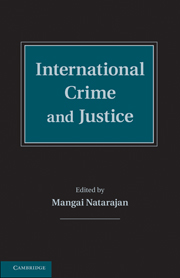Book contents
- Frontmatter
- Contents
- List of Figures
- List of Tables
- List of Contributors
- Foreword
- Preface
- Introduction
- Part I International Criminology
- Part II Law, Punishment, and Crime Control Philosophies of the World
- Part III Transnational Crime
- Part IV Organized Crime and Terrorism
- Part V International crime
- Part VI Delivering International Justice
- Part VII International Cooperation and Criminal Justice
- Part VIII International Research and Crime Statistics
- Part IX International research resources
- World Map
- Index
Part IX - International research resources
Published online by Cambridge University Press: 05 October 2014
- Frontmatter
- Contents
- List of Figures
- List of Tables
- List of Contributors
- Foreword
- Preface
- Introduction
- Part I International Criminology
- Part II Law, Punishment, and Crime Control Philosophies of the World
- Part III Transnational Crime
- Part IV Organized Crime and Terrorism
- Part V International crime
- Part VI Delivering International Justice
- Part VII International Cooperation and Criminal Justice
- Part VIII International Research and Crime Statistics
- Part IX International research resources
- World Map
- Index
Summary
The information revolution of the past twenty years has helped to create and disseminate vast stores of data on every imaginable topic. While this has benefited every field of research, it may have particularly helped those studying crime occurring in distant parts of the world. From the relative comfort of their offices these researchers can travel to the far reaches of the planet at the click of a keyboard and gather critical items of information about crimes committed, offenders arrested, and punishments administered. On a personal note, this almost makes me wish that I was starting my research career now, rather than twenty years ago when, as a young student, I had to traverse half the Indian subcontinent, from my university in Madras (now Chennai) to the Tata Institute of Social Sciences Library in Bombay (now Mumbai) to compile the literature review for my research on women policing.
No doubt the Tata Institute Library still holds a vast store of books, journals, government reports, and newspapers, which are all of great value for researchers. There is also no doubt that the library, just as all other research libraries, has been transformed by the Internet, which provides electronic access to many of the paper materials held on their shelves. Even in the libraries themselves it is easy to see the results of this revolution. Rarely do students and professors wander among the stacks, searching for that elusive book or journal.
- Type
- Chapter
- Information
- International Crime and Justice , pp. 493 - 494Publisher: Cambridge University PressPrint publication year: 2010



